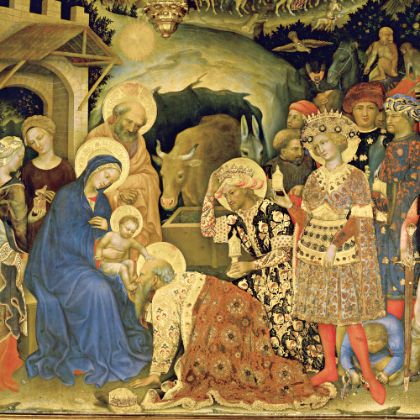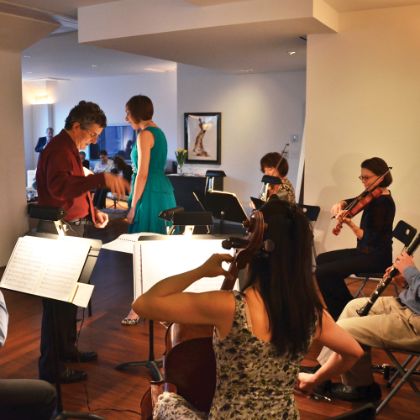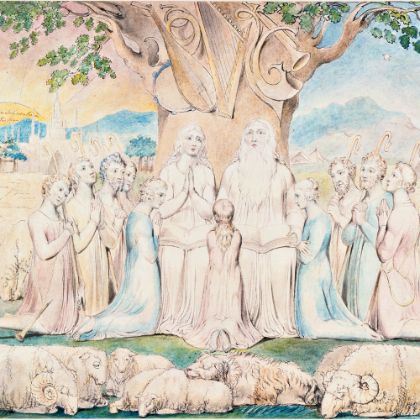The American master has temporarily disappeared.
By Daniel Felsenfeld
Samuel Barber’s Antony and Cleopatra opened at the then–brand new Metropolitan Opera at Lincoln Center on September 16, 1966, a night that will be remembered as one of the great disasters in music history. It was as much the director’s fault as anyone’s, not to mention the technology of the hall, the difficulty of the score and the ambition of Barber himself, whose music was too intimate to make an aspiring, grandly scaled 1960s Aida happen gracefully. But aside from these missteps, the Antony and Cleopatra debut reads as a misstep of history. These were the late sixties, and experimentation was where it was at. Barber’s opera, with its big, forceful orchestral thrust, its sinewy seductive music and gushing arias, must have seemed square: too hip for the musically conservative, who wanted their operas served crushingly tuneful, and beyond démodé for the young Turks who sought to turn upside down the old world. Complexity was the order of the day, and most composers — including no less than Aaron Copland, Leonard Bernstein and Igor Stravinsky — had been at least in part lured by Arnold Schoenberg’s method of Composition with Twelve Tones. Barber’s music did not lack for complexity, but it was of an emotional rather than mathematic variety, which was then hopelessly passé.
The show flopped. Barber sailed for Europe and wrote little for the rest of his life. At this point in his narrative, dying in a pauper’s grave would have earned him the sympathy vote, but instead he retired to a lavish apartment on Central Park East and quietly fizzled. In his life, he often referred to himself as a “living dead” composer, but how accurately this came to pass was no doubt chilling to him in his dotage.
Samuel Barber’s centenary this year offers not so much an opportunity to laud the output of a national treasure as much as an argument for vanished greatness and good work neglected. How does one celebrate one of the great composers of the American twentieth century who wrote one of his era’s enduring masterworks, moved from triumph to triumph, and composed successful works for some of the world’s most important ensembles and soloists? The short and usual answer is: concerts and box sets, festivals and symposia, hortatory articles and handsome books. But little of this has appeared, mostly because Barber’s work remains comparatively obscure and unexamined, hidden in plain sight. That is, of course, save for the one big piece: Adagio for Strings, premiered by no less than Arturo Toscanini in 1938 (on the precipice of war) but more famous to us from The Elephant Man, Platoon and the funerals of FDR and JFK, a piece whose haunting melody remains, yes, one of the most poignant ever penned. But while this work flourishes in manifold forms (including but not limited to the original scoring for string quartet), the rest of his vast, beautiful feast of output lies, for the most part, dormant. It is not that he or his work is obscure — far from it — but that it doesn’t hold the pride of place it ought to.
‘Perhaps with the centenary as a lynchpin, Barber’s music — and all the overt emotion and vivid virtuosity for which it stands — will be reshuffled into the slot in which it belongs.’
It is not Barber that changed, obviously, as his work stays fixed in the amber of the past. Instead, the musical world changed around him, with experimentalism of various stripes being the watchword of the “new” music, from the “uptown” experiments with mathematical precepts led by Pierre Boulez and leaning to the Continent, to the “downtown” experiments of process music and patterns, leaning to the art galleries of SoHo and the old Greenwich Village. All of this experimentalism caused Barber to end his life in a kind of cynosure of obsolescence. It might be an overly precious bit of wrenching providence that aside from the cinematic–funeral Adagio, Barber’s second most famous piece is an aria from his opera Vanessa called “Must the Winter Come So Soon?” Could he possibly have foretold his fate? Or is history easily packaged into this kind of ironic parcel?
The Adagio may be Barber’s Bolero, a seminal work whose crossing of the elitist divide comes with the steep price of disregard for the rest of his canon. As a “celebration” of the composer’s hundredth birthday, The New York Times published a lone article not about the composer but about the cottage industry of the Adagio for Strings — emphasizing its attraction to film directors, deejays and club-hoppers. In a way, this means Barber has arrived, or at least landed in a spot seldom reached by the “high art” toilers among us: enduring appeal to the at-large (read: non-classical-music-loving) culture. But to those of us who admire him for all the reasons he’s to be admired, who love him for far more than one piece, Barber’s appeal is not exactly news.
To understand why Barber is not better appreciated now, it is useful to look at his life. Born to privilege in 1910 in Westchester, New York, Samuel Osborne Barber knew his vocation early, famously confessing in a letter to his mother at age eleven the “worrying secret” that he was “meant to be a composer.” His uncle, Sidney Homer, was a composer of note, and sensing rare gifts in the nervous boy, recommended that he attend a brand-new conservatory in Philadelphia.
Barber enrolled in the first class of the Curtis Institute of Music (at the request of the conservatory’s founder, Mary Curtis Bok) and was a formidable presence there — as a baritone, pianist and, of course, composer. While still in school, his envious classmates were already referring to him as one of the great Bs of classical music, a position he no doubt both repudiated and adored. He met another young man, an Italian named Gian Carlo Menotti, who would be his lifelong companion, lover, friend and collaborator. While still at Curtis, Barber won the prestigious Bearns Prize for his (lost) violin sonata, and had a piece (yes, the Adagio for Strings) selected as one of the rare American works to be conducted by Arturo Toscanini for the NBC Symphony. From there, Barber continued on an international career of the highest order, basking in a string of standing ovations and critical paeans — until September 16, 1966, a night that ought to have been among his greatest.
Though Barber was patrician, removed, and invented a musical form called the “Essay” that ought to have been celebrated by the ideas-of-order acolytes of atonal music, perhaps his lushness and romanticism was just too much. Or was it not enough? Or did he just represent a fading tradition: the old-world classical music virtuoso at his or her sweatiest, where music-making happened on the surface instead of the deep structure of the composition? The list of great performers who took on his work — Toscanini, Eugene Ormandy, Orlando Cole, Bruno Walter, Leopold Stokowski, Vladimir Horowitz, Eleanor Steber, Leontyne Price and Dietrich Fischer-Dieskau, to name a few — is a who’s who of mid-century virtuosi, irreplaceable legends who have not been surpassed — and yet also, to the twenty-first-century way of thinking, representatives of a certain Golden Age, a “then” that is no longer. As this kind of grand thinking disappeared and the rarefied America of that era — the America that could make these brilliant musicians into household celebrity names — vanished, so too went Samuel Barber.
What remains is his spectacular catalogue: three Essays for Orchestra; concerti for violin, cello and piano; sonatas for piano, and piano and cello; a string quartet (wherein lies the Adagio); three operas (including the ravishingly melodramatic Vanessa, written with Gian Carlo Menotti, and the wry short A Hand of Bridge); the wind pieces Summer Music and Capricorn Concerto; a vast catalogue of songs; and a massive and rewarding body of work for chorus, boasting masterpieces like Prayers from Kierkegaard and the glorious Neruda cycle The Lovers. We have ambitious pieces like Medea’s Meditation and Dance of Vengeance, Andromache’s Farewell and the startlingly vivid Overture to The School for Scandal, the heartbreaking Fadograph of a Yestern Scene, the robust Dover Beach and the vastly popular (thanks to Dawn Upshaw) Knoxville: Summer of 1915, with its gorgeous, sepia-toned nostalgia. There’s even Die Natali, a deeply neglected concatenation of Christmas favorites. (Conductor Marin Alsop is recording Barber’s orchestra output on the Naxos imprint.)
Perhaps the all-but-the-Adagio Barber never fit neatly into any particular aesthetic movement. Arguably, the whole “midtown” school of composers (the vastly different Ned Rorem, David Del Tredici, John Corigliano, Aaron Kernis and Richard Danielpour, to name just five) owes something to the niche Barber carved. But this argument falls into the trajectory trap of codifying history: critics and historians need to think in trends or schools and schisms, and Barber — much like fellow travelers Sibelius, Martinu, Enescu and Elgar — did not fit with his peers, even while he was alive. Copland, Stravinsky and Bernstein conducted in public, authored books, appeared in the newspaper, taught and rallied other composers. Barber did none of these things, save for a short stint as an instructor both at Curtis and Tanglewood. Some composers led lives of scandal; Barber did not (his homosexuality was an aspect of his life he managed to keep entirely to himself). In the middle of the century, artistic allegiances were everything; composers cleaved to strict strands of thought and buttressed others who held their way of thinking. Barber led a quiet, almost — almost — modest life, writing music.
Maybe it was Barber’s European outlook (if not pedigree) that makes his case so complicated, his output so stubborn. When Aaron Copland was single-handedly defining the quintessential “American” sound, Barber was reading Trollope (or Proust in the original French, or Moby-Dick in Italian, for some reason) and imbuing music with a lavish understanding of Greek mythology, taking his cue not from jazz but from Sibelius. Even British composer Benjamin Britten was holed up at the seaside writing operas that dared to investigate “certain” unspoken aspects of sexuality and violence. Not so Barber, who made his biggest pieces out of melodrama, or from Shakespeare’s complicated, talky Antony and Cleopatra; who believed in the power of (art) song, of poetry; and who made music of a taut construction that answered to no way of thinking, subscribed to no school of thought save his own calling.
The current state of Barber’s work is not entirely bleak — it’s a temporary disappearance, not a murder. Adagio and its attendant remixes aside, certain works are loping their way back into the repertoire, especially Vanessa and the big, failed Antony and Cleopatra. And there is one stunning biography by Barbara Heyman on the bookshelves now, two new books due out this year (with one, of course, centering only on the Adagio) and some scholarly resource material on its way. None of this will “resurrect” Barber, because he does not exactly need it; he was never completely gone to begin with, just occluded, buried somewhere not far from the surface of all that came after him. But perhaps with the centenary as a lynchpin, Barber’s music — and all the overt emotion and vivid virtuosity for which it stands — will be reshuffled into the slot in which it belongs. Barber was a profound technical master and emotional virtuoso, a composer who, in not striving to be a “maverick,” was maverick indeed, and who took classical music for what it was and is: an end unto itself, a great and valuable tradition that needed to be advanced not by merely smashing a barrier but by studying, creating and doing it.

-

From Christemasse to Carole
The birth of Christmas in medieval England
Read More
By David Vernier -

The Next (Not-So-)Big Thing
New chamber orchestras are popping up all over America.
Read More
By Colin Eatock -

A Father's Lament
Finding solace in the sound of authentic sorrow
Read More
By Rev. Jake Bohstedt Morrill